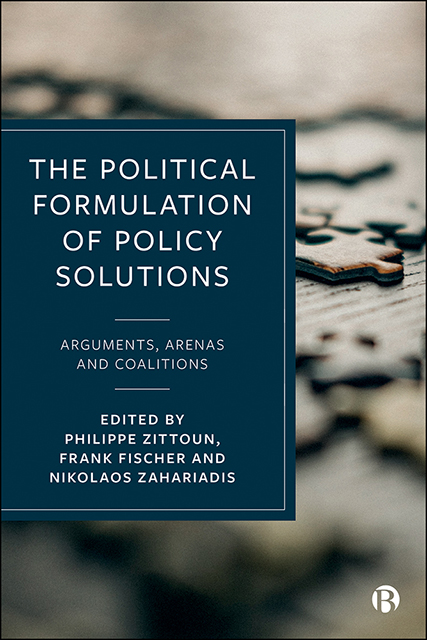Book contents
- Frontmatter
- Contents
- Notes on Contributors
- 1 Introduction – Policy Formulation: A Political Perspective
- 2 Upcycling a Trashed Policy Solution? Argumentative Couplings for Solution Definition and Deconstruction in German Pension Policy
- 3 Binding and Unbinding Problem– Solution Associations in US Agricultural Policy Making: The Introduction and Demise of Direct Payments to Farmers
- 4 The Role of Expert Reporting in Binding Together Policy Problem and Solution Definition Processes
- 5 Coalitions and Values in the Flow of Policy Solutions
- 6 The Marks of Ownership: The Promotion of Carbon Capture and Storage in France
- 7 Anticipating Public Approval in the Binding of Immigrant Integration Problems and Solutions
- 8 Discourse Coalitions and the Messiness of Policy Solutions: College Governance in Nevada
- 9 Policy Solution Ownership: Road-Space Re-Allocation as a New Approach to Urban Mobility
- Index
4 - The Role of Expert Reporting in Binding Together Policy Problem and Solution Definition Processes
Published online by Cambridge University Press: 21 April 2023
- Frontmatter
- Contents
- Notes on Contributors
- 1 Introduction – Policy Formulation: A Political Perspective
- 2 Upcycling a Trashed Policy Solution? Argumentative Couplings for Solution Definition and Deconstruction in German Pension Policy
- 3 Binding and Unbinding Problem– Solution Associations in US Agricultural Policy Making: The Introduction and Demise of Direct Payments to Farmers
- 4 The Role of Expert Reporting in Binding Together Policy Problem and Solution Definition Processes
- 5 Coalitions and Values in the Flow of Policy Solutions
- 6 The Marks of Ownership: The Promotion of Carbon Capture and Storage in France
- 7 Anticipating Public Approval in the Binding of Immigrant Integration Problems and Solutions
- 8 Discourse Coalitions and the Messiness of Policy Solutions: College Governance in Nevada
- 9 Policy Solution Ownership: Road-Space Re-Allocation as a New Approach to Urban Mobility
- Index
Summary
Introduction
Our objective in this chapter is to study expert reporting as a type of political work that can powerfully link public problems with policy solutions. In particular, we look at expert categorization as a type of binding process for policy problems and solutions. Expert categories are both discursive and material arguments: they represent complex discursive strategies that carry specific framings of material reality. Our hypothesis is that expert reporting and categories can play a powerful binding and cementing role in problem definition and policy solutions since they display the same properties as policy instruments (Lascoumes and Le Galès 2005), that is, they implicitly carry specific framings and perform lock-in effects.
In this chapter we focus on the expert category of environmental indicators. The environment is a policy sector prone to scientific and political controversy, where expert knowledge plays an important framing role (Jordan and Greenaway 1998; Fischer 2000; Forsyth 2003; Miller 2004; Aykut and Dahan 2015). Framing, here, is the ordering process through which experts select and label the relevant features of the situation. In this chapter, we first demonstrate that despite their relation to nature, ecological indicators should not be taken for granted: they are not just neutral technical categories but partly political constructions. Hence, more often than not, negotiations around the elaboration of environmental indicators are politically charged even though they use technical terminology and reasoning. They are seldom pre-established categories but hybrid categories that indicators’ promotors tweak to adjust to various influences.
We selected three cases studies for examination, chosen because they represent various degrees of competition – sometimes even controversy – in the elaboration of ecological indicators. Looking at contested cases allows us to analyse expert reporting in-the-making and prevents us from taking false assumptions for granted. We chose contrasting case studies that could display the two types of controversy distinguished by Gingras (2014, pp 114–15) – that is, scientific controversy, which happens in relatively confined spaces, and public controversy, which mobilizes various actors, way beyond the circle of scientists (for example, journalists, activists, political and economic actors and citizens). We thus successively present the construction of indicators in the field of water pollution in rivers and at sea and in the field of forest biodiversity.
- Type
- Chapter
- Information
- The Political Formulation of Policy SolutionsArguments, Arenas, and Coalitions, pp. 73 - 92Publisher: Bristol University PressPrint publication year: 2021



